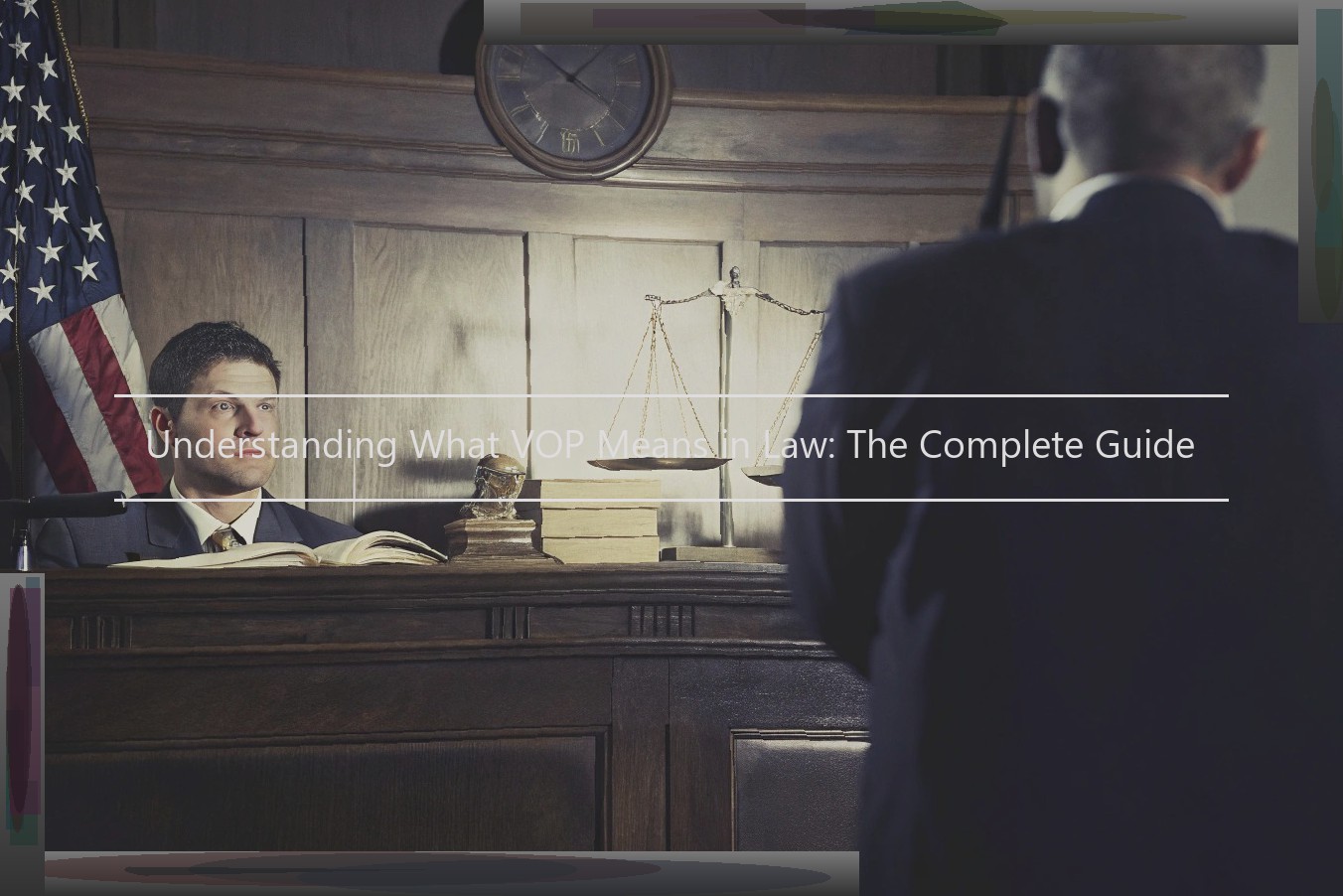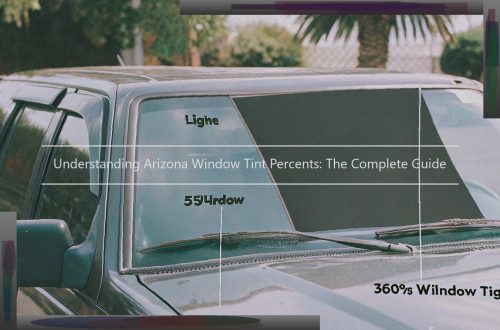Understanding What VOP Means in Law: The Complete Guide
What Does VOP Mean in Legal Terms?
Of the different acronyms a criminal defense attorney will encounter over time, few have the impact on your life that a VOP can have. Taking a second to understand what a VOP is and some of the potential consequences can help you a long way if you are facing a VOP.
Simply put, VOP stands for Violation of Probation. Whenever you are sentenced to probation, whether it be adult probation or juvenile probation, you must follow the rules put in place by the court and the officers of the court. These rules, such as reporting regularly to your probation officer and/or completing 100 hours of community service, become the terms of your probation. When you fail to follow one of the terms of your probation, you become subject to a VOP or Violation of Probation. You may have heard of a Direct or Indirect VOP. A Direct VOP is when you fail to complete a term of your probation and you are given a warning by your probation officer that it must be corrected. If you do not then fix the issue then it becomes an Indirect VOP. An example of a Direct VOP is if you are ordered to complete 100 hours of community service when, two months into probation, it is discovered that you failed to complete the community service, that is a basis for a VOP. On the other hand , an example of an Indirect VOP is if you are ordered to complete your community service by March 1st but did not complete your service until March 15th. While the requirement was met, a minor violation may be alleged because of the slightly late deadline. A VOP is a new criminal charge that can potentially carry serious consequences. A probationer is entitled to an evidentiary hearing prior to being found in violation of probation and having their probation revoked. However, if convicted at your VOP hearing, the Judge can sentence you to the maximum probationary sentence you were originally given when first placed on probation. Depending on the offense, this can include a period of incarceration in state prison. A VOP can take away a very valuable resource, Probation. This is basically a second chance provided by the court, that the charges were met with first-time offender treatment. I have often told clients that a VOP is one of the simplest processes I handle but one of the most upsetting and aggravating to many clients. The loss of probation can be frustrating because it takes away the very valuable tool of counseling, employment assistance, school assistance, drug and alcohol treatment, mental health assistance and job placement services that can many times help steer individuals towards a better life.

Reasons for a VOP
There are a few common ways in which a Violation of Probation can occur. Most often, a VOP charge stems from a failure to abide by the terms of probation or by the reporting requirements of being on probation; in other words, doing something you are not supposed to be doing or not doing something you are supposed to be doing. For example, a VOP may be issued if you fail to complete your community service hours, report on schedule to your probation officer, pay restitution or a fine, or remain in Florida for your probation period. Additionally, if you have been ordered to complete a course, a counseling program, or attend meetings as a part of your probation, a VOP charge may be issued if you fail to do so.
A VOP may also be issued if you pick up another criminal charge while on probation. This may happen in any type of charge, including misdemeanors and felonies. Any new charge brought against you, whether it is a violation of your terms of probation or not, can and should be reported to your probation officer, so that they may verify your compliance with conditions ordered at sentencing.
The most important thing about VOP is that the defendant is already presumed guilty. Anything you may be accused of doing is a violation, meaning that, in the eyes of the court in charge, you failed to help your case. To add to the problem, there is no way of getting around the maximum punishment being handed down for a VOP. If you are found in violation of your probation, the maximum penalty will be enacted; no exceptions.
Penalties for a VOP
In many cases, a VOP is found in addition to other criminal charges. For example, it is common for a defendant who is on probation for a violent crime to be accused of violating that probation after being arrested for a new violent crime. It is also possible for a VOP to occur as a result of non-compliance with the terms of probation and/or the associated supervision. While the gravity of rules that are broken while on probation varies depending on the unique circumstances of the case, one example is being charged with using or possessing drugs while on probation for a drug-related offense. As you can see, committing a VOP stemming from additional criminal charges is more severe than a VOP stemming from a petty rule violation. Both examples, however, can lead to new penalties being imposed. These include:
Sentencing for a VOP often depends on whether the violation is classified as a "technical" violation or a "substantive" violation.
Technical Violations – Accused of a minor offense such as skipping drug tests, missing appointments with a probation officer, or staying out past curfew.
Substantive Violations- Accused of a new crime while on probation.
Dealing with a VOP
Before a VOP charge is made, preliminary hearings do not commonly determine whether or not you receive a violation. At this point, the court has determined that there is some amount of culpability, whereas the goal is now the levying of a punishment for the infraction. In most cases, the prosecution is going to have all available pieces of evidence already compiled on the matter, and the burden of proof will lay on the defendant – as the prosecution will be working under the assumption that the defendant has committed a violation of probation. In reality, you are essentially being held in contempt of court, though you are not technically being charged with a crime. As long as the prosecution can prove that there is any kind of technical violation, such as failing to pay restitution or fines, they can win the case. As the defendant, if you have failed to complete community service or your drug tests have come up positive for a prohibited substance, the prosecution doesn’t even have to prove that you did these things purposefully. They also don’t have to prove that it is a failure to fulfill the requirements of your probation. It is essentially enough for them to prove that an action, no matter how small, took place, making it a little-known "no fault" matter unless the defendant’s attorney can prove otherwise.
After the arrest warrant and warrant for violation of parole/probation, the particular circumstances of the situation are examined. Depending on severity, the probation officer may subject you to an arrest, a failed drug test, or a warning to not further violate your conditions of release. Once in the courtroom, the defendant’s conduct is examined, and the prerequisites for considering a confined sentence are outlined.
Other than the defendant, those present at the arraignment include the judge, the defense attorney, the prosecutor, the court reporter, and any other court staff required to conduct proceedings. As the accused is presumed innocent under the law, he or she is not required to testify in court, nor to speak unless or until called upon by the judge. After the judge reads the charge (which is usually a long sentence outlining the entirety of the violation, including the underlying charge that led to it), the attorney for the state will read the facts of the violation itself, without regards to the underlying charge.
After the proceedings, the defendant will be allowed to change their plea. It will be determined whether you will be tried in front of a jury or a judge, and the defendant will be asked whether or not they have their own attorney or would like to work with the public defender’s office. Bail will be considered, and a date will be scheduled for the next hearing, where the defendant must appear.
Defenses for a VOP Charge
The first major defense that a lawyer may look to is the contention that the VOP was not wihtin the jurisdiction of the alleged violation. When a judge hears a probation violation with a defendant present, a determination will be made as to the jurisdiction in which the defendant was sentenced. This is usually the Court’s home court or the place where the probation was meant to be served. In a case involving out of state entities or defendants, issues could arise as to whether the Court hearing the violation has jurisdiction to hear it. The main example here is when a probationer is on supervised probation in Pennsylvania stemming from an arrest that occurred in New Jersey. If something occurs in NJ, can PA hear the violation? Usually in this scenario a judge in PA would refrain from hearing the matter unless there was some sort of connection to the state. An example was the case of Pa v. Richards, where a NY sex offender was charged with violations occurring in NY while he serving probation in PA. The Court noted that a determination would have to be made as to whether there was personal jurisdiction and if there was, whether the VOP should be transferred to NY.
Another defense would be to argue that the "technical" violation was not serious enough to warrant a VOP. Many times a defendant will have a serious new arrest but the defendant will also have some little technical violation. In this scenario, many lawyers will argue that any technical violation did not lead to any harm and the judge should not go after the person for the technical violation if he was stopped for the new charge. An example of this would be a defendant who is charged with a VOP for absconding from supervision, but he was arrested on major drug charges shortly after stopping his supervision. Of course, it makes logical sense that a judge wouldn’t necessarily hold the person on the technical violation if he just got caught up for something major. This is especially true when it comes to bail violations . And this dovetails into a related defense, which is the claim that the Judge should not find the Violation if it is not "Serious". In the case of Pa v. Rottet, a defendant was charged with a violation of his probation for failing to reside at his approved residence. However, he had been charged with new crimes during a time period when he was incarcerated. The Court determined that the act in question was so minor that it should not be considered a violation of the conditions of probation. In another case of Pa v. Walters, the defendant failed to report to his parole officer at the appointed time. However, he did just show up a few days later and pay a fine which he was delinquent on. The Court of Appeals agreed that this was not a violation of probation.
Another common defense in these scenarios would be that there is a lack of requisite intent to violate the law. In a case involving sentences of probation, a defendant must have an intention to violate. In other words, if a person wants to comply with his sentence and do all the things that the judge ordered, then a violation should not be charged. An example where this defense would apply would be if a defendant was originally charged with DUI. He was sentenced to probation and one of the conditions was to complete treatment and attend meetings. However, the defendant claims that he did attend and did complete the program, just not exactly as the judge ordered. In that case, the lawyer might be able to argue that a retroactive compliance is allowable, at least for the new sentence. This is because he was in fact trying to comply with the order. As a result, a lawyer could argue that the probation violation should be dismissed. If the case is for technical violations, then it is unlikely that the judge will find that there was positive compliance for something like missing an appointment with their probation officer. But if you can argue there was a legit reason, then the lawyer might be able to make another argument for the Judge to dismiss the case.
Impact of a VOP on Future Probation
A VOP conviction may impact whether or not a defendant is placed on probation again in the future. For example, if the defendant does not successfully complete drug court and is revoked for a positive alcohol/drug screening, the judge is not going to place the defendant back into drug court at a later date. Or if defendant is revoked under the special drug court conditions for consumption of alcohol, the judge is not going to re-allow the defendant into drug court if he has a future VOP. Additionally, if the defendant is charged with another offense in the future, the state most likely will seek a higher bond based on the new alleged criminal conduct, coupled with the VOP. Further, if the defendant is convicted of another offense in the future, the defendant’s sentence may be impacted by the previous VOP. Further, if the defendant pleads to additional, sometimes more serious charges in the future, the defendant may be sentenced to serve the remainder of the sentence incurred in the VOP. For example, the defendant was sentenced on October 15, 2010 to a twenty-four (24) month suspended prison sentence, with a term of supervised probation. Six months later, the government discovers the defendant committed another robbery in the State of Florida. After the defendant pleads to the robbery charge, the government may agree to sentence the defendant to serve the remaining portion of the VOP sentence. In this example, the defendant would serve an eighteen (18) month sentence. And because the defendant is serving the remainder of the suspended sentence on the VOP conviction, the defendant’s probation is revoked upon his new conviction. As such, the VOP conviction is and can be a very serious matter. It is imperative to hire a well experienced trial attorney to represent your interests.
Avoiding Violations of Probation
For those on probation, the downside of a VOP is that it could have been avoided. A few simple things can avoid a VOP and the hassle that ensues if you are served with a warrant. It is incumbent upon the probationer to go out of his or her way to avoid a warrant.
First, report as directed to your probation officer. The report date is missed more often than one would think. The worst case scenario on a missed report date is it appears the probationer is in willful violation of the supervision order, which may get you served with a no bond warrant.
Second, be honest with your probation officer. If you are not drug testing, tell your probation officer when you took the last drug test. If you have fallen into a funk and need treatment , tell your probation officer that too. Class attendance issues, family issues, money issues, job issues etc. become one of two things: 1) a real concern addressed between you and your probation officer or 2) a missed meeting, leading to a VOP.
Third, comply with all conditions of supervision. Do not let conditions pile up to the point you forget the condition! Remember you are a visitor in a new place and the conditions are meant to be understood; not an exertion of governmental power. If you visit somebody’s house and there are too many rules, don’t visit! Finally, do not ignore you probation officer. Work together to ensure you are compliant.




